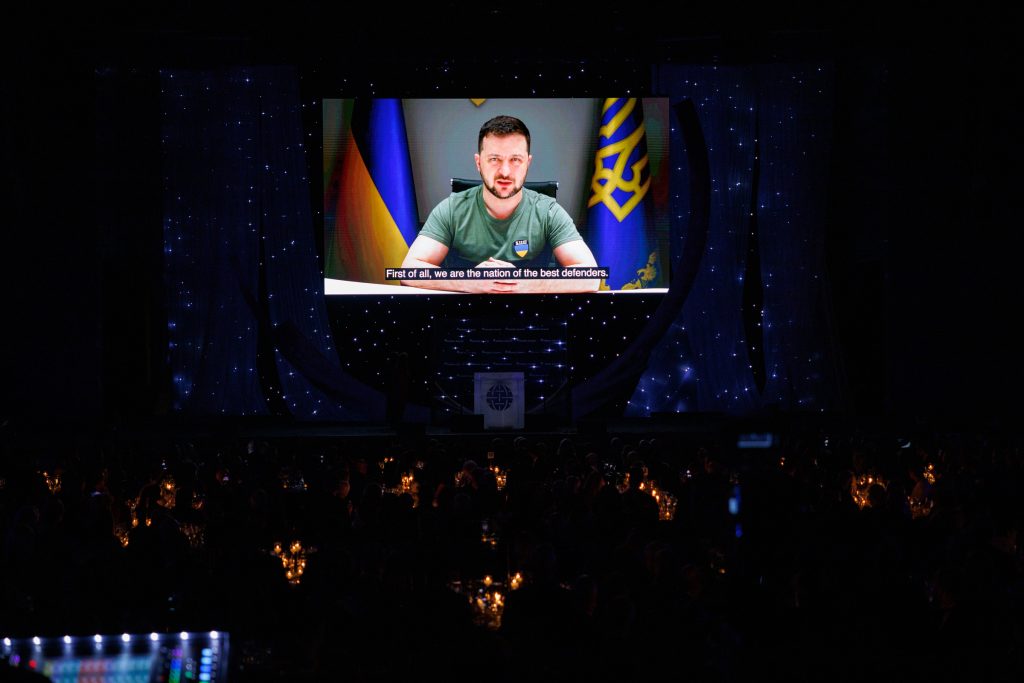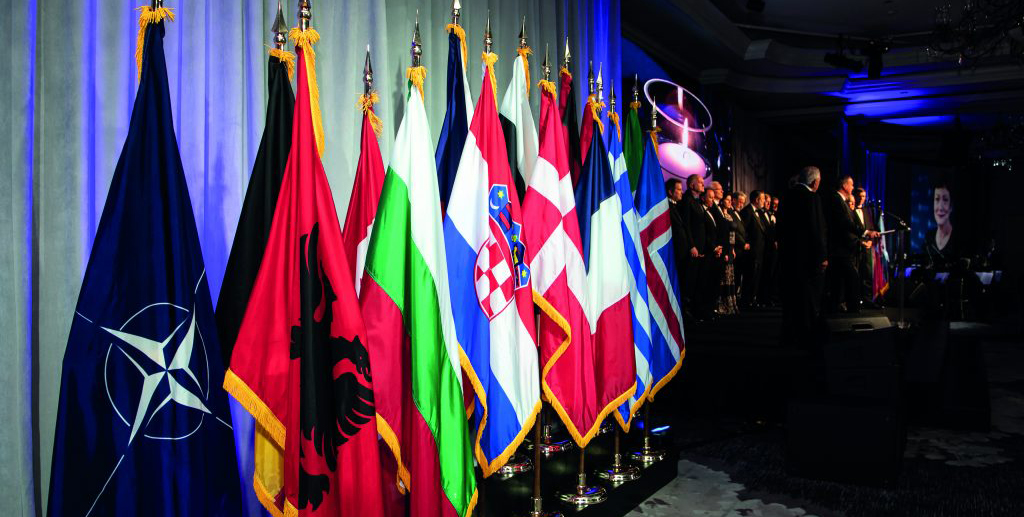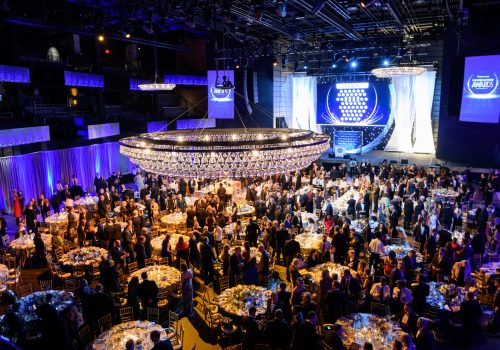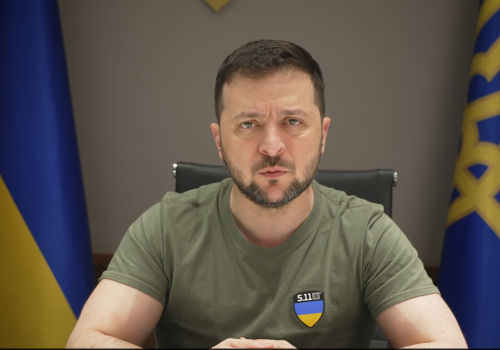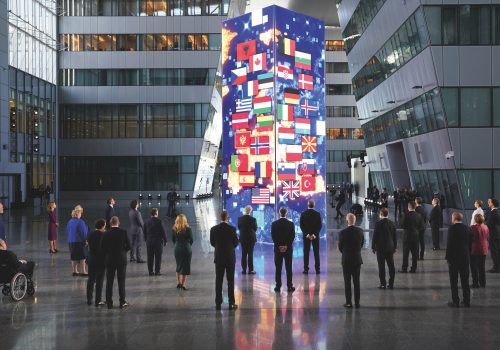The world has changed in unfathomable ways since the Atlantic Council last recognized a crop of distinguished leaders just six months ago. In November, the Council honored the heroes who guided the world through a historic pandemic with their drive and innovation.
Today, the world faces a new danger: a devastating war in Europe that has upended the continental security order and imperiled energy security around the world. Yet amid Russian President Vladimir Putin’s invasion of Ukraine—which has fueled global instability—visionaries in business, politics, and culture have risen to the challenge.
This year’s Distinguished Leadership Awards recognized their efforts.
Italian Prime Minister Mario Draghi has lent moral direction to the European Union’s response to Putin’s aggression. His compatriot, Claudio Descalzi, CEO of Italian energy giant Eni, is leading an example-setting effort to wean Italy off Russian gas and push it toward a more sustainable future. Meanwhile, Ukrainian pop singer Jamala has used her status as a leading cultural export to raise global awareness of her country’s plight.
Then, of course, there are the Ukrainian people themselves—whose bravery and resilience against overwhelming odds have captured the world’s attention and provided new hope for defenders of democracy everywhere. As Ukrainian President Volodymyr Zelenskyy said in a video message to the more than five hundred attendees in Washington: “Courage is our national trait.”
For Frederick Kempe, CEO and president of the Atlantic Council, the crisis—and the rallying effect it’s had on the transatlantic community—has reinvigorated the organization’s mission of shaping the global future together. “It could be a future where the sanctity of borders, human rights, individual freedoms, human progress, and rule of law triumph over the law of the jungle,” he said.
Here are more highlights from the gala:
Mario Draghi: ‘This is Europe’s hour and we must seize it.’
- The Italian prime minister delivered an impassioned case for European unity but also reform as a “next-generation EU” in the face of Russian aggression in Ukraine. “We must remember the urgency of the moment and the magnitude of the challenge,” he said. “This is Europe’s hour and we must seize it.”
- That means Europe must “streamline defense spending,” transition to clean energy, boost its economic recovery, and battle inequality. “These radical transformations require change in our institutions and may require changes in our founding treaties,” Draghi said.
- Vowing that any ceasefire and peace with Russia must be dictated by Ukraine, Draghi looked ahead to the rebuilding process. “Ukraine will need its own Marshall Plan, much like the one that contributed to the special relationship between Europe and the United States,” he said.
- And Draghi vowed that his nation will be up to the task, referencing Italy’s devastating early battles with COVID-19. “As it has done time and again in its magnificent history, Italy has bounced back,” he said. “And we are ready to do our part together with our European and transatlantic allies to overcome this tragic moment, to restore peace where there is evil.”
- Draghi was introduced by US Treasury Secretary Janet Yellen, who lauded the Italian leader’s know-how when it comes to the complex work of sanctioning Russia. “As we’ve rolled out a historic package of sanctions, I found great comfort in having a partner who deeply understands firsthand the plumbing of the international financial system, who fully internalizes the impacts and intricacies of the consequential actions we’re taking,” Yellen said.
Volodymyr Zelenskyy: ‘Hundreds of thousands fight—and millions help’
- As the Ukrainian people were presented with a special Distinguished Leadership Award, the widely celebrated leader praised his population’s courage—saying it’s represented by “thousands of real stories, names, and heroic feats.”
- Citing several examples of heroism by Ukrainian forces—including the world-famous fighters on Snake Island and those currently defending Mariupol—Zelenskyy praised his compatriots as “the best defenders” and asked for a moment of silence to commemorate the fallen.
- Ukraine’s heroes, he added, also range from children and the elderly to businesspeople and artists who have answered their country’s call in a time of need: “The Ukrainian nation is one in which hundreds of thousands fight and millions help.”
- Zelenskyy concluded by issuing an appeal to the audience to visit Ukraine and meet its people: “Look into their brave eyes, shake their strong hands, and you’ll see they’re doing this not for glory, that they don’t just need awards—but concrete support and concrete help.” The most crucial element, he says—besides more Western sanctions and military aid—is “the feeling that they’re not alone in this difficult struggle.”
- Fresh off her recent trip to Kyiv where she met with Zelenskyy in person, US House Speaker Nancy Pelosi presented the award to the Ukrainian people. “Make no mistake, the fight for freedom in Ukraine is a fight for freedom in the world, and America will be with them until the fight is won,” Pelosi said.
Claudio Descalzi: ‘Keeping a sharp focus on a just energy transition.’
- Invoking the words of his company’s founder—that “the real treasure isn’t in the gold coins we can make, but in the resources we can make available to human development”—Descalzi, the Distinguished Business Leadership Award honoree, hailed Eni’s “dual-flag approach” of developing energy markets while also helping the environment and local communities.
- The Ukraine crisis, he added, “has made us even more resolute in working for the security and sustainability of the energy system while keeping a sharp focus on a just energy transition.” To that end, Eni has explored technology ranging from carbon capture and storage and bio-refineries, to renewables and other breakthrough solutions, Descalzi said: “Energy companies are, first and foremost, technology companies.”
- The United States and Africa are two zones of innovation for Eni, he added. In the former, Descalzi’s company is working with MIT researchers to develop magnetic fusion energy—dubbed a “star in a bottle”—while in the latter, it’s pioneering net-zero upstream development and working with local partners to produce agro-feedstock to power Eni’s bio-refining initiatives.
Jamala: ‘Together we are invincible’
- The Crimean winner of the 2016 Eurovision song contest, and recipient of the Distinguished Artistic Leadership Award, began her emotional speech by detailing her escape from Ukraine on February 24—the day Putin invaded—“to the sound of air raid sirens with my two sons in my arms, just like my great-grandmother years ago.”
- Referring to the Soviet mass deportation of Crimean Tatars in 1944, she lamented how the violent past had reared its ugly head: “The saddest moment for me is understanding that no matter how many times it is said ‘Never again,’ history repeats itself with terrifying accuracy.”
- To help stop a war she described as a “genocide of the Ukrainian people”—one that’s “soaked with blood, [but] full of hope”—she called on the US audience to speak up and demonstrate against “ruthless Russian tyranny.” She added: “Today, this war is at my home. But where will it be tomorrow if it is not stopped?”
- Jamala dedicated the award to her compatriots: “To the people at the front and those who volunteer and cure, to every Ukrainian artist helping today to spread the truth, to every mother hiding their kids in a bomb shelter. Together we are invincible.”
Dan Peleschuk is the editor of New Atlanticist. He has reported widely on politics, society, and culture throughout the former Soviet Union, particularly in Russia and Ukraine.
Further reading
Wed, May 11, 2022
Full transcript: 2022 Distinguished Leadership Awards salute the people of Ukraine, Mario Draghi, and more
Transcript By
The Italian prime minister, businessman Claudio Descalzi, and Ukrainian singer Jamala were among the honorees at the Atlantic Council's premier gala event Wednesday night.
Wed, May 11, 2022
‘A nation where hundreds of thousands fight and millions help.’ Read President Volodymyr Zelenskyy’s tribute to the people of Ukraine.
New Atlanticist By
Appearing by video at the Atlantic Council's Distinguished Leadership Awards, the Ukrainian president offered a moving, personal dedication to the heroism of the Ukrainian people under Russian assault.
Tue, May 10, 2022
Annual Report 2021/2022: Shaping the global future together
Annual Report By
Our Annual Report 2021/2022 provides insight into our impact and agility as we enter our seventh decade of operations.
